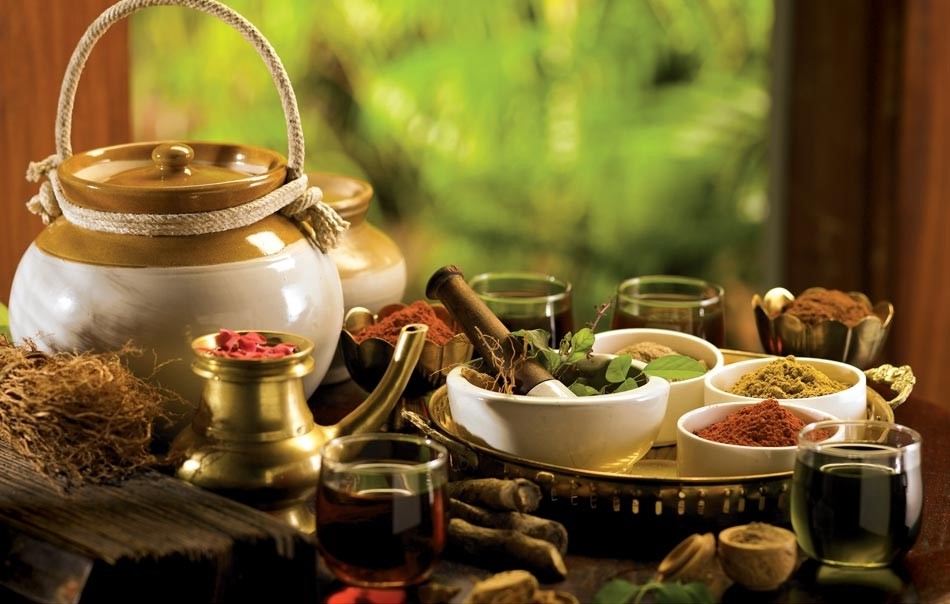Ayurveda is the science and art of life and longevity. The rishis of old gifted us with the understanding of how the five great elements of ether, air, fire, water, and earth are orchestrated for our embodied life by the three doshas: vata, pitta and kapha. Each person is a combination of all elements and all doshas in a unique way. When we understand our doshic pattern, we can work harmoniously with our environment. We tend to stay in balance physically, mentally and emotionally so that we may pursue and practice what Amma guides us to: love, transformation and Self-Realization.

Any person can experience any imbalance. A vata imbalance is marked by experiences of dry, cold, scattered, spacy, airy, anxious, nervous, frail, and ungrounded. A pitta imbalance intensifies the experiences of heat, anger, impatience, sensitivity, stress, and judgment. The kapha imbalance overextends the experiences of heavy, sleepy, inwardly depressed, cold, stagnant, and tearful.

The types of practice for tridoshas
- A deep relaxing prana flowing asana practice neutralizes the airy and spacy vata dosha.
- A calming, heart-centered practice of asanas balances the aggressive and agitated pitta dosha.
- A dynamic and energizing practice reduces the sluggish, lethargic energy.

For vata imbalance
- Avoid cold, windy conditions; too much exercise and travel; too much stress; foods that are hard, dry, rough and cold.
- Sesame oil abhyanga daily is one of the best balancers. Also massage the inside of the nostrils with oil several times daily.
- A basti enema with dashamoola and sesame oil is recommended for constipation. One half teaspoon ghee in warm water every night before bed may be a simpler practice.
- Foods should be warm, sweet, moist, and slightly oily, and no leftovers (cooked the day before or using ingredients that have been previously cooked). Favour tastes that are naturally sweet, salty and sour.
For pitta imbalance
- Avoid hot, humid weather and refrain from pungent, sour, salty, fermented, deep-fried, and/or spicy food and drink. Minimize alcohol (pure sour), and avoid stressful, aggravating conditions or reactions.
- Set aside time for virechana with castor oil and some ginger juice to lower acidity in the lower stomach and intestines. This is a bowel purge as well.
- Drink Pitta-reducing tea such as licorice root powder + turmeric, cooled to room temperature, pomegranate juice and coconut water. To reduce burning during eliminations, make a tea of fennel, cumin, and coriander seeds, 1 teaspoon each in 2 cups of water. Boil down to 1 cup and sip at room temperature during the day, for 2-3 days.
- With skin rash, drink the above tea and massage with coconut oil.
- For hot flashes use ashwagandha, shatavari and amalaki powders, 1 teaspoon each in three cups of water, to drink throughout the day between meals. Do this for at least 3 months.
- Enjoy abhyanga with coconut oil.
- The pitta pacifying diet is sweet, bitter, and astringent, neither cold nor hot, and no leftover food.
For kapha imbalance
- Avoid damp, cool, still weather. Avoid big meals and heavy, sweet, sour, or salty foods and leftovers. Avoid too much relaxation.
- Drink vegetable juices for a few days or eat cooked vegetables such as asparagus, bitter melon, celery, beet greens, broccoli, cabbage, carrot, cauliflower, kale, and leafy greens.
- Jala neti is superseded in ayurveda by nasya using anu tailam. Massage face with oil and lie down with a hot flannel on your forehead and another across your cheekbones and nose (not covering the eyes) for a short time. Then tip the head back and insert a few drops of oil into each nostril and draw it up into the sinuses. A simple home formula is fresh ginger juice, fresh lime juice, and a small amount of jaggery in 1 teaspoon warm water. Mix, strain and use as above.
- For sore or congested throat: turmeric and raw honey taken orally, and/or a salt and turmeric gargle.
- Nausea in morning (not due to pregnancy): drink 1 liter of licorice tea with the intent to vomit it out. Wait 2 hours before eating a light rice meal or soup.
- Colds: drink ginger powder and turmeric powder tea, ¼ teaspoon each in 1 cup boiling water, every 4 hours. Steam inhalation can include eucalyptus oil.
- Best diet for kapha is lightly cooked vegetables and dry grams, with bitter, pungent, and astringent tastes.


0 Comments